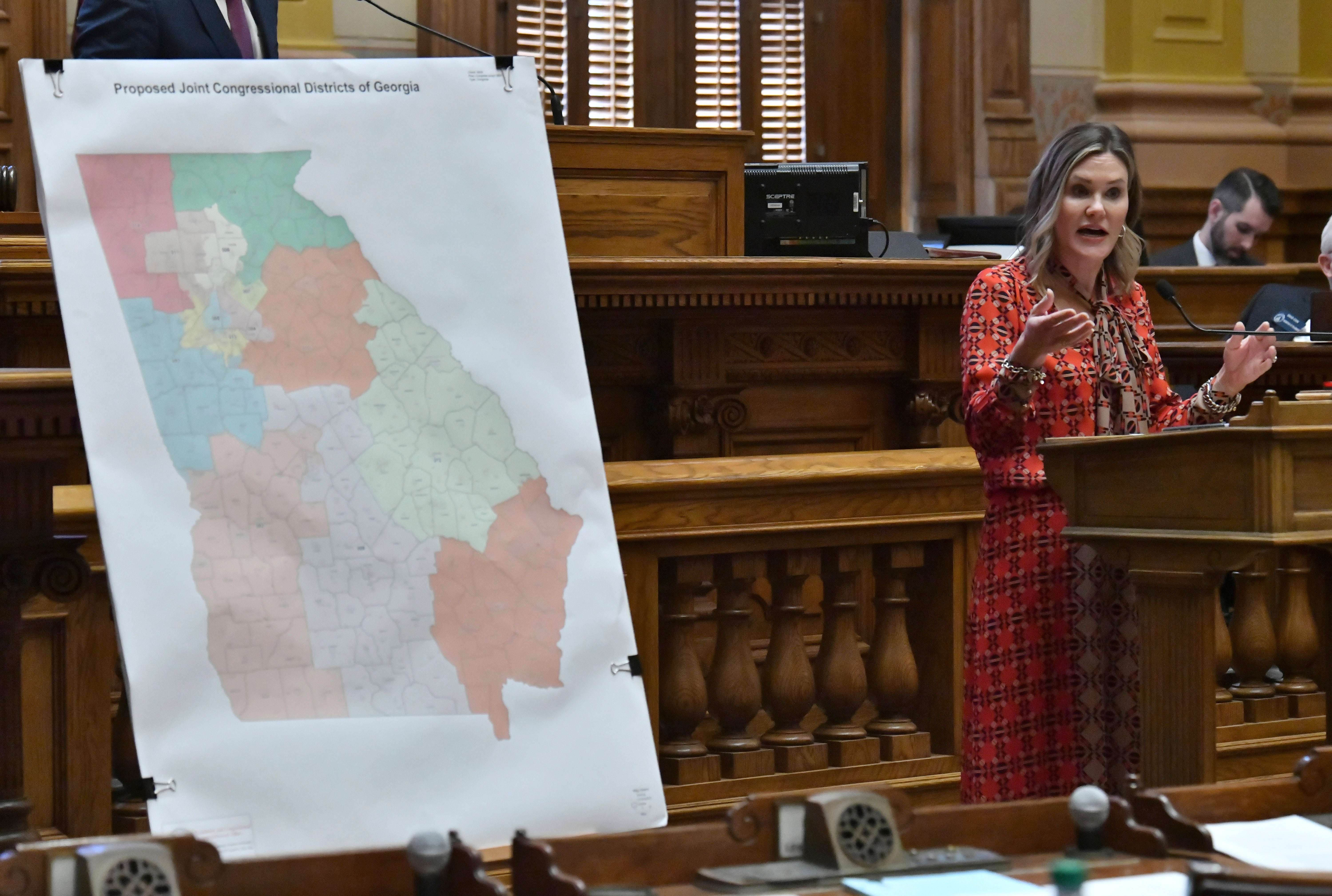How GOP gerrymandering could reshape political maps for 2022 and beyond
Voting rights advocates sound alarms over the once-a-decade redistricting process, and legal scholars warn ‘midnight is approaching’ without federal intervention, Alex Woodward reports


A year before US voters cast ballots in midterm elections that could determine the balance of power in Congress, Republican lawmakers in several states are already likely to gain at least five seats in the House of Representatives through the process of redrawing their political maps alone.
The latest wave of redistricting – the once-a-decade process of redrawing each states’ political boundaries after the release of new Census data – is underway, and GOP state lawmakers have produced some of the most incongruous, disproportionate maps since passage of the 1965 Voting Rights Act, raising the spectre of gerrymandering with increasingly little oversight.
New maps could erode competitive elections, consolidate power in already-GOP-dominant state legislatures, and allow Republicans to take control of the House in 2022.
This month, for the first time since its initial passage at the dawn of the ‘60s civil rights movement, the US Senate failed to restore the Voting Rights Act, the landmark civil rights law that bars racial discrimination at the polls, as congressional Republicans bolster their state-level counterparts by refusing to support federal voting rights legislation that would undermine GOP attempts to make it harder to vote, fuelled by Donald Trump’s bogus “rigged election” narrative.
Electoral maps are also being drawn for the first time in decades without full anti-discrimination protection coverage under the Voting Right Act, after a 2013 Supreme Court ruling tossed out a crucial element requiring jurisdictions with histories of discrimination to have federal “preclearance” before proposed rule changes can go into effect.
Senate Republicans invoked a filibuster four times this year to stop voting rights legislation from advancing to the floor for a vote, and this year marked the first ever that the Voting Rights Act was not renewed with majority bipartisan support.
If Congress fails to pass such legislation, “American democracy will be at critical risk,” according to a letter signed by a group of more than 150 political science and election scholars, urging congressional Democrats to amend Senate filibuster rules to pass voting rights legislation with a simple majority vote, sending a warning that “midnight is coming” in the face of their inaction.
“Not only could this failure undermine the minimum condition for electoral democracy – free and fair elections – but it would in turn likely result in an extended period of minority rule, which a majority of the country would reject as undemocratic and illegitimate,” they wrote in a letter this week. “This would have grave consequences not only for our democracy, but for political order, economic prosperity, and the national security of the United States as well.”
GOP lawmakers have a steady advantage for redrawing maps in their favour – Republican legislatures control the redistricting process in states with 179 House seats, while Democratic lawmakers oversee the process in states that have 75. Other states’ redistricting processes are determined by nonpartisan or bipartisan commissions or divided state governments.
Georgia Governor Brian Kemp is set to sign off on new maps from his state’s Republican-controlled legislature that are likely to give Republicans 64 per cent of House seats, in a state that Joe Biden won with 49.5 per cent of the vote, according to Mother Jones.
In states that have approved new electoral maps, the number of districts where the 2020 presidential margin was within five percentage points has fallen from 23 to just 10, according to an analysis from The Washington Post. New maps have already scored a double-digit increase in Republican seats compared with previous maps in those states.
Those changes also fly in the face of population growth among people of colour, analysts have shown.
In Texas, results of the 2020 Census saw a surge in population growth among people of colour. The number of Latino residents grew by nearly 2 million over the last decade, and nearly all of the population gains fell within three major metropolitan areas – among some of the largest in the country.
That growth means the state will gain two more seats in Congress, as well as four seats in the state House.
But despite that growth largely stemming from minority populations, which analysts argue are more likely to lean Democratic, political maps in Texas have been redrawn to protect incumbents and all but guarantee Republican dominance in the state legislature.
People of colour accounted for 95 per cent of the state’s population growth over the last decade, but new maps do not contain any electoral openings for those communities, according to the Brennan Center for Justice at the NYU School of Law.
Rather than explicitly drawing maps on the demographic makeup of minority communities, Republicans are relying on so-called “race-blind” maps, though boundaries that dilute minority power are often the byproduct of partisan politics – tipping the scales in favour of Republicans over Democrats – rather than the racial makeup in those districts.
“Even without fancy mapping software, smart politicians know the demographics of their home regions like the backs of their hands,” the Brennan Center reported. “And in states like Texas and North Carolina with high rates of racially polarised voting, they know that Democrats are overwhelmingly people of color and that discriminating against Democrats is invariably racially discriminatory.”
Voting rights advocates and civil rights groups – which have protested outside the White House and faced dozens of arrests every Wednesday in November – are urging Joe Biden to get involved with filibuster reform, and to push Democratic holdouts like Joe Manchin and Kysten Sinema to get involved before midterms approach.
Stephany Spaulding, spokesperson for civil rights organisation Just Democracy, said that “to protect our democracy and stop these blatant gerrymandering attempts in their tracks, the Senate must listen to the will of the American people and eliminate the filibuster once and for all to pass vital voting rights legislation.”
Join our commenting forum
Join thought-provoking conversations, follow other Independent readers and see their replies
Comments
Bookmark popover
Removed from bookmarks